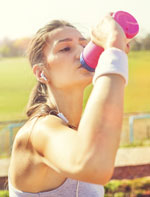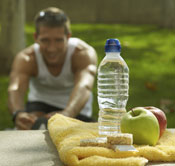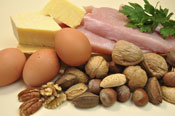
Sports Nutrition
Athletes who want a winning edge need the right nutrition. When you give your body the right fuel by drinking enough water and eating a balanced diet, you will make the most of your athletic talents and gain more strength, power, and endurance when you train.
This article contains some general sports nutrition guidelines. To achieve top performance, your diet should be based on a variety of factors including your age, weight, physical condition, and the type of exercise you are doing. Consult your doctor for individualized sports nutrition advice.
HydrationWater is the most important nutrient for athletes. Water comprises about 60% of body weight and is essential for almost every bodily function. Because your body cannot make or store water, you must replace the water that you lose in your urine and sweat.
Everyone should drink at least two quarts (64 oz.) of water each day—and athletes need even more. To stay hydrated and avoid overheating, drink plenty of fluids before, during, and after sports or exercise. When you work out or compete, especially in hot weather, try to replace the amount of water you lose in sweat by drinking the same amount of fluid.
 Stay hydrated by drinking plenty of fluids before, during, and after exercise.
© Thinkstock, 2014
Stay hydrated by drinking plenty of fluids before, during, and after exercise.
© Thinkstock, 2014
Drinking cool water is the best way to keep hydrated during workouts or events that last an hour or less. Sports drinks made up of 6% to 10% carbohydrates can help you stay hydrated during longer events. Most sports drinks should be diluted with approximately 50% water.
Because thirst is not a reliable way to tell if you need water, be sure to drink even if you are not thirsty. You will not start feeling thirsty until you have already lost about 2% of your body weight—enough to hurt performance. Also, if you stop drinking water as soon as your thirst is satisfied you will get only about half the amount you really need.
The following tips will help you stay hydrated:
- Drink small amounts of water frequently rather than large amounts less often.
- Drink cool beverages to lower your core body temperature and reduce sweating.
- Track your sweat loss by weighing yourself both before and after exercise. For every pound lost through sweat, drink 16 to 24 oz. of water. Your body weight should be back to normal before your next workout.
- Pay attention to the amount and color of your urine. A large volume of clear urine is a sign that you are well-hydrated. Smaller amounts or dark yellow urine can indicate dehydration.
A balanced diet is another key to sports nutrition. Eating the right combination of fuel (calories) from carbohydrates, proteins, and fats will give you energy for top performance.
Carbohydrates
Carbohydrates—the most important source of fuel—should provide about 60% to 70% of your daily calories. Carbohydrates are found in many foods, including:
- Fruits
- Vegetables
- Pasta
- Bread
- Cereal
- Rice
 Eating fruit, or another food high in carbohydrates, will help you maintain energy during competition.
© Thinkstock, 2014
Eating fruit, or another food high in carbohydrates, will help you maintain energy during competition.
© Thinkstock, 2014
Your body converts the sugars and starches in carbohydrates into energy (glucose) or stores it in your liver and muscle tissues (glycogen). This gives you endurance and power for high-intensity, short-duration activities.
If your body runs out of carbohydrate fuel during exercise it will burn fat and protein for energy—causing your performance level to drop. This may happen if you start exercising without enough stored muscle glycogen or if you exercise intensely for longer than an hour without eating more carbohydrates. It may also happen if you do multiple repetitions of high-intensity, short-duration exercises or if you participate in multiple events or training sessions in a single day.
The following tips will help you maintain carbohydrate fuel so that you can stay energized and perform at your best:
- Start your exercise or competition with glycogen-loaded muscles by eating carbohydrates for at least several days before the event.
- To replenish energy and delay fatigue, eat additional carbohydrates when you exercise or compete for longer than one hour.
Proteins
Proteins should provide about 12% to 15% of your daily calories. Proteins are found in many foods, including:
- Meat
- Fish
- Poultry
- Eggs
- Beans
- Nuts
- Dairy products
Proteins give your body the power to build new tissues and fluids among other functions. Your body cannot store extra protein so it burns it for energy or converts it to fat. The amount of protein you need depends, in part, on your:
 Good sources of protein include meat, cheese, eggs, and nuts
© Thinkstock, 2014
Good sources of protein include meat, cheese, eggs, and nuts
© Thinkstock, 2014
- Level of fitness. Physically active people need more protein than those who do not exercise. You also need more protein when you start an exercise program.
- Exercise type, intensity, and duration. Endurance athletes often burn protein for fuel, as do bodybuilders and other athletes who perform intense strength-building activities.
- Total daily calories. Your body burns more protein if you do not consume enough calories to maintain your body weight. This can happen if you eat too little or exercise too much.
- Carbohydrate intake. Your body may use protein for energy if you exercise with low levels of muscle glycogen or if you do repeated training sessions without eating more carbohydrates. When you start with enough muscle glycogen, protein supplies about 5% of your energy; otherwise, it may supply up to 10%.
Fats
Fats should provide no more than 20% to 30% of your daily calories. Saturated fats come from animal-based foods, such as meats, eggs, milk, and cheese. Unsaturated fats are found in vegetable products such as corn oil.
Your body needs small amounts of fat for certain critical functions and as an alternative energy source to glucose. Eating too much fat, however, is associated with heart disease, some cancers, and other major health problems. Also, if you are eating too much fat, it probably means that you are not eating enough carbohydrates.
How your body uses fat for energy depends on the intensity and duration of exercise. For example, when you rest or exercise at low to moderate intensity, fat is the primary fuel source. As you increase the intensity of your exercise your body uses more carbohydrates for fuel. If your body uses up its glycogen supply and you continue exercising you will burn fat for energy, decreasing the intensity of your exercise.
Nutrition before CompetitionWhat you eat several days before an endurance activity affects performance. The food you eat on the morning of a sports competition can ward off hunger, keep blood sugar levels adequate, and aid hydration. Try to avoid eating high-protein or high-fat foods on the day of an event since this can put stress on your kidneys and take a long time to digest.
To perform at your highest level, follow these general nutrition guidelines before an event:
- Eat a meal high in carbohydrates.
- Eat solid foods 3 to 4 hours before an event. Drink liquids 2 to 3 hours before an event.
- Choose easily digestible foods, rather than fried or high-fat foods.
- Avoid sugary foods and drinks within one hour of the event.
- Drink enough fluids to ensure hydration. A good guideline to follow is: Drink 20 oz. of water 1 to 2 hours before exercise and an additional 10 to 15 oz. within 15 to 30 minutes of the event. Replenishing fluids lost to sweat is the primary concern during an athletic event. Drink 3 to 6 ounces of water or diluted sports drink every 10 to 20 minutes throughout competition.
Carbohydrate Loading
To avoid running out of carbohydrates for energy, some endurance athletes—including long-distance runners, swimmers, and bicyclists—load their muscles with glycogen. To do this they eat extra carbohydrates and exercise to energy depletion several days before an event. To "carbohydrate load" before an event:
- First, exercise to muscle fatigue. Your workout must be identical to the upcoming event to deplete the right muscles.
- Next, eat a high-carbohydrate diet (70% to 80% carbohydrates, 10% to 15% protein, and 10% to15% fat), and do little or no exercise for three days before the event.
Some endurance athletes believe that following this carbohydrate-loading regimen will ensure that muscles loaded with unused glycogen will be available to work for longer periods of time during competition. Consult your doctor for advice before trying a carbohydrate-loading diet.
Source: http://orthoinfo.aaos.org/topic.cfm?topic=A00370
